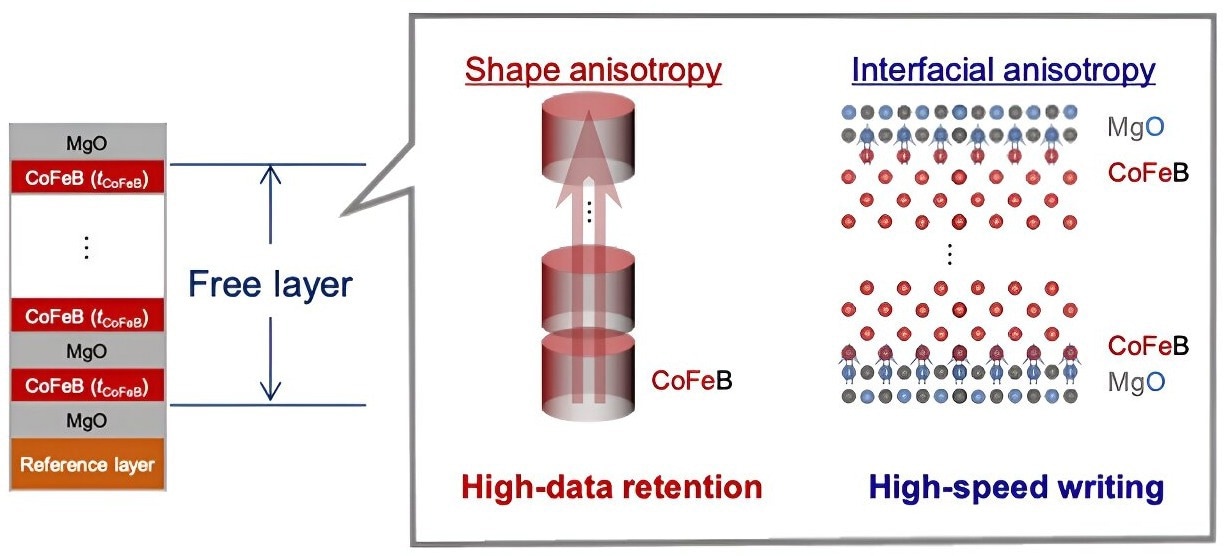Tohoku University researchers have created specifications for a single-nanometer magnetic tunnel junction (MTJ) that enables performance customization to satisfy the needs of numerous applications, including AI, IoT nd space technologies.
 A film stack of the developed MTJ with the multilayered ferromagnetic structure. Shape anisotropy is enhanced by increasing the thickness of CoFeB and decreasing the number of CoFeB/MgO layers. Interfacial anisotropy is enhanced by increasing the number of CoFeB/MgO layers. Image Credit: Junta Igarashi, Butsurin Jinnai, and Shunsuke Fukami. From npj Spintronics (2024). DOI: 10.1038/s44306-023-00003-2
A film stack of the developed MTJ with the multilayered ferromagnetic structure. Shape anisotropy is enhanced by increasing the thickness of CoFeB and decreasing the number of CoFeB/MgO layers. Interfacial anisotropy is enhanced by increasing the number of CoFeB/MgO layers. Image Credit: Junta Igarashi, Butsurin Jinnai, and Shunsuke Fukami. From npj Spintronics (2024). DOI: 10.1038/s44306-023-00003-2
This innovation will enable high-performance spintronic non-volatile memory that works with current semiconductor technology. The information was published on January 4th, 2024, in the journal npj Spintronics.
Non-volatile memory is distinguished by its capacity to maintain data without an external power source. As a result, substantial development efforts have been focused on non-volatile memory due to its ability to lower power consumption in semiconductor integrated circuits (ICs).
Performance requirements for non-volatile memory vary depending on the application. For example, AI/IoT applications require high-speed performance, but automotive and space technologies favor excellent retention capacities.
Some of the drawbacks of current memory technologies could be solved by spin-transfer torque magnetoresistive random access memory (STT-MRAM), a non-volatile memory technology that stores data by exploiting the intrinsic angular momentum of electrons, known as spin.
The magnetic tunnel junction (MTJ), which consists of two ferromagnetic layers separated by a thin insulating barrier, is the fundamental component of STT-MRAM. While many issues still need to be resolved, scientists have been working for a long time to address the challenge of shrinking MTJs without sacrificing performance.
Using 1× nm technology nodes, STT-MRAM has been successfully created for automotive semiconductors. It uses MTJs with dimensions in the range of several tens of nanometers. However, to accommodate future nodes, MTJs must be reduced to single-digit nanometers, or X nm, while maintaining the flexibility to adjust performance following particular use cases.
The research team created a method for engineering single-nanometer MTJs using a de facto standard material system, the CoFeB/MgO stack structure, to achieve this. They achieved high-retention and high-speed capabilities, respectively, by controlling the shape and interfacial anisotropies individually by varying the thickness of each CoFeB layer and the quantity of [CoFeB/MgO] stacks.
Consequently, applications ranging from retention-critical to speed-critical can be customized for the MTJ performance. Shape anisotropy-enhanced MTJs showed good retention (> 10 years) at 150 °C at single nanometer sizes, whereas interfacial anisotropy-enhanced MTJs exhibited rapid speed switching (10 ns or less) below 1 V.
Since the proposed structure can be adapted to existing facilities in major semiconductor factories, we believe that our study provides a significant contribution to the future scaling of STT-MRAM.
Junta Igarashi, Study Lead Author, Tohoku University
Principal Investigator Shunsuke Fukami added, “Semiconductor industries generally tend to be conscious of long-lasting scaling. In that sense, I think this work should send a strong message to them that they can rely on the future of STT-MRAM to help usher in a low-carbon society.”
Journal Reference:
Igarashi, J., et. al. (2024) Single-nanometer CoFeB/MgO magnetic tunnel junctions with high-retention and high-speed capabilities. npj Spintronics s. doi:10.1038/s44306-023-00003-2.
Source: https://www.tohoku.ac.jp/en/